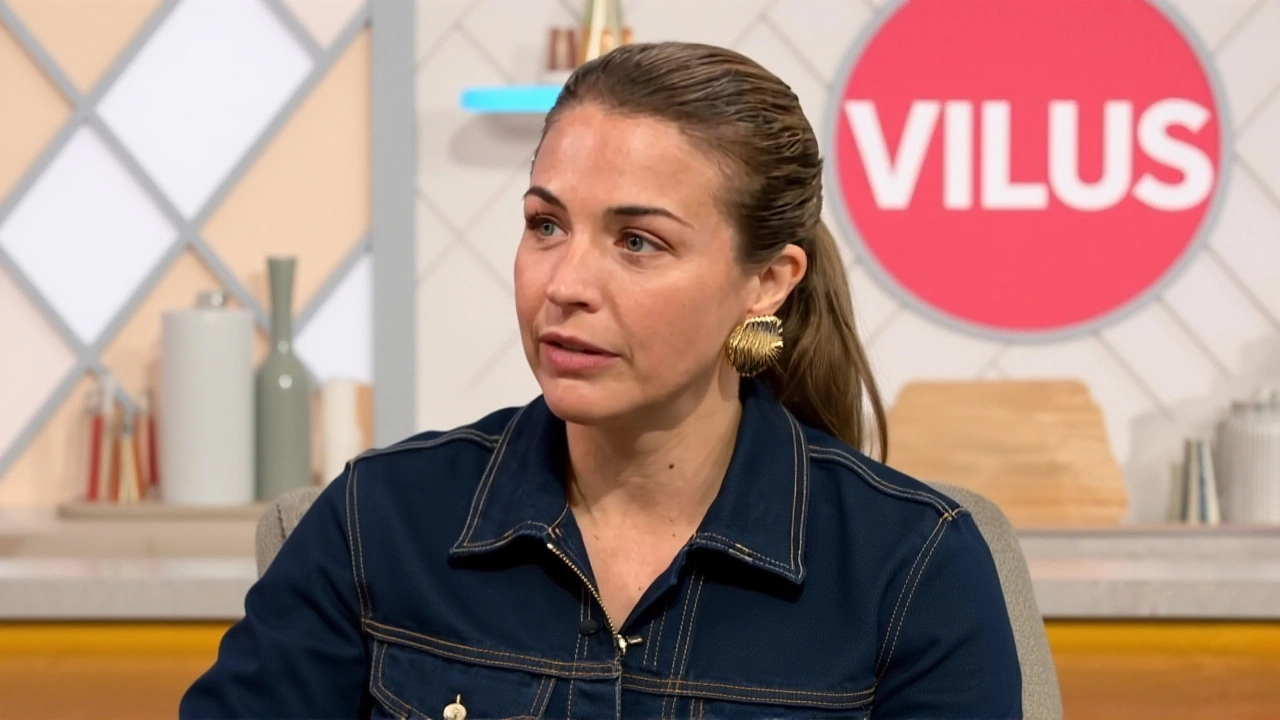
When Gemma Atkinson, a Manchester-born radio presenter, and Gorka Márquez, the Spanish ballroom dancer who’s been a fixture on BBC’s Strictly Come DancingTelevision Centre, White City, London since 2016, sat down to record their new podcast, they didn’t expect to become accidental therapists for exhausted parents everywhere. But that’s exactly what happened. In a candid interview with the Press Association—published in the Laois Nationalist on November 24, 2025—they peeled back the glittering veneer of their public lives to reveal a home filled with spilled cereal, mismatched socks, and the quiet panic of forgetting a school permission slip. "I think it’s nice for people to know that every single family is having chaos," Atkinson said. "Regardless of your profession, your income, your Instagram feed—we’re all just winging it and hoping for the best."
Behind the Glitter: A Normal Family in a Spotlight
It’s easy to assume that celebrities who dance for a living live in a world of choreographed perfection. But Márquez, 35, wants to shatter that illusion. "People think that because we work in the public eye, everything is glittery," he explained. "But we’re just very normal and chaotic. We’re juggling the school run with breakfast and walking the dog—just like you." His wife, Atkinson, who grew up in Greater Manchester, nodded in agreement. Their two children—six-year-old Mia, in primary school, and two-year-old Thiago, in nursery—turn their weekdays into a high-stakes relay race. And their dog, Benji, isn’t just a pet; he’s the glue. "Walking Benji is our only non-negotiable," Atkinson said. "If we skip it, the whole day unravels." The couple’s home, though unmentioned by name, sits somewhere in the UK, far from the studio lights but no less busy. They don’t have a nanny. No personal chef. Just two parents trying to remember if it’s lego day or art day at Mia’s school, while Thiago tries to eat yogurt with his hands—again.The Birth of ‘Lost in Translation’
Enter Lost in Translation, their podcast launched in late 2025. It’s not about dance moves or celebrity gossip. It’s about the quiet, unglamorous battles of parenting across cultures. Atkinson, British through and through, and Márquez, raised in Spain, navigate different parenting styles, language barriers, and the occasional meltdown over whether toast should be cut into triangles or squares. "We record every Tuesday," Atkinson said. "We take the kids to school, walk Benji, grab a coffee on the way to the studio, and just… talk. About what annoyed us yesterday. About who forgot to pay the water bill. About how Thiago screamed for 20 minutes because his socks were ‘too scratchy.’" It’s raw. It’s real. And listeners are responding. Comments flood in: "I thought I was the only one," "My husband and I just cried listening," "Thank you for making me feel normal."Countering the ‘Parent Police’
Márquez’s message to new parents is direct: "There isn’t one rule book. Every situation is different. Every family is different. Every child is different." He’s calling out what he calls the "parent police"—the anonymous commenters on social media who dictate how kids should sleep, eat, or behave. "I’ve seen mothers get torn apart for breastfeeding in public. Fathers get shamed for letting their kids watch cartoons. It’s exhausting," he said. "You don’t need a degree in parenting. You just need love, patience, and the courage to trust yourself." Atkinson added: "Social media doesn’t show the 11 p.m. tantrum. Or the 3 a.m. feeding. Or the fact that we once sent Mia to school in two different shoes. We’re not perfect. And that’s the point."
Why This Matters
In a world where influencers post flawless morning routines and curated family photos, Atkinson and Márquez are offering something radical: honesty. Their podcast isn’t just entertainment—it’s a quiet rebellion against the pressure to perform parenthood. And it’s resonating. With over 100,000 downloads in the first month, Lost in Translation has become a lifeline for parents who feel isolated by the myth of perfection. The couple’s story isn’t unique—but their willingness to speak up is. In a culture that rewards polished personas, they’ve chosen vulnerability. And in doing so, they’ve given thousands of families permission to breathe.What’s Next?
They’ve already recorded 12 episodes. Next up: a special on navigating grief with young children, inspired by a listener’s message. They’re also considering live recordings, where audiences can ask questions. "We want to keep this going," Atkinson said. "Because as long as parents feel alone in their chaos, we’ll keep talking."
Background: A Cultural Blend in the UK
Márquez’s decade-long tenure on Strictly Come Dancing has made him a household name in Britain, even as he remains deeply connected to his Spanish roots. Atkinson, a familiar voice on UK radio since the early 2010s, brings a grounded, working-class Manchester sensibility to their dynamic. Together, they’ve built a life that’s equal parts British pragmatism and Spanish warmth. Their home, though private, is a blend of tea and tapas, English nursery rhymes and Spanish lullabies. And their children? They’re growing up bilingual, bicultural, and—most importantly—unafraid to be themselves.Frequently Asked Questions
How does ‘Lost in Translation’ help parents dealing with social media pressure?
The podcast normalizes the messy, unfiltered reality of parenting by sharing real, unedited conversations between Atkinson and Márquez. Listeners report feeling less alone after hearing episodes about forgotten homework, tantrums, and sleepless nights—issues rarely shown on social media. By openly discussing their own struggles, the couple counters the myth of "perfect parenting" that fuels anxiety and guilt among caregivers.
Why is cultural difference important in their parenting approach?
Atkinson’s British upbringing emphasizes structure and reserve, while Márquez brings Spanish warmth, extended family involvement, and more relaxed mealtime norms. These differences lead to daily negotiations—like whether kids should eat dinner at 7 p.m. or 9 p.m.—which the podcast turns into teachable moments. Their blend shows that there’s no single right way to raise children, especially in multicultural households.
What role does Benji the dog play in their daily routine?
Benji isn’t just a pet—he’s the anchor of their family rhythm. Their daily walk with him is the only consistent, shared activity between Atkinson and Márquez during the week. It’s during these walks that they decompress, talk about their day, and reconnect before the podcast recording. The routine gives them structure, fresh air, and a rare moment of calm amid the chaos.
How has Gorka Márquez’s role on Strictly Come Dancing influenced his parenting views?
Years on Strictly have exposed Márquez to thousands of families who watch the show as escapism. He’s noticed how viewers project their own desires for order and perfection onto celebrities. This has made him more determined to show that even people in the spotlight struggle with the same daily chaos as everyone else. His advice to viewers—"trust your instincts"—comes from seeing how rigid expectations harm real families.
Are Atkinson and Márquez planning to expand the podcast beyond parenting topics?
While parenting remains the core, they’ve hinted at future episodes exploring cultural identity, long-distance relationships with extended family, and even how to handle disagreements with in-laws. Their next special episode, focused on grief and young children, was inspired by listener stories. They’re open to evolving the show as long as it stays authentic.
What impact has their message had on their children?
Mia, now six, has started asking questions about why people post "perfect" pictures online. She told her parents, "I don’t want to look perfect. I want to look happy." Thiago, two, doesn’t understand yet—but he loves the sound of their voices on the podcast. They’ve made it clear to their kids that being real matters more than being polished. And that, perhaps, is their greatest legacy.



